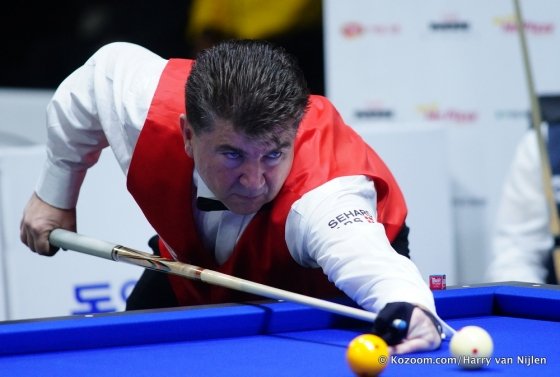The Germans are very good at inventing words that describe something complicated. The English translation for Angstgegner that comes closest, is "nemesis". Angst is another word for fear, Gegner means opponent. That guy you can never beat, the one you always hope to avoid. But no, there he is again, his name next to yours in the draw.
And it is almost as if you know what is going to happen. It's the billiard version of "la sensation du déjà vu". You've been here before, and you know you're going to get beaten again.
But the definition is not yet complete. I can't say: "Dani Sánchez is my Angstgegner." That's nonsense, because "Angst" played no part in our matches over the years. He can beat me with a cue in one hand and a bowl of tomato soup in the other. For someone to be an actual Angstgegner, he must beat you far more often than both your averages would suggest. He can only have the same playing strength as you, or be weaker! On paper, that is.
Modern 3-cushion has at least one very well-documented example of an Angstgegner relationship between two good players, and it lasted for roughly four seasons.
The better player of the two was Dick Jaspers, in his early years as a BWA professional. His nemesis was Tonny Carlsen from Denmark. Yes, a formidable player, who was finalist in a World Cup three times. But even Tonny himself would have no problem admitting that he was not as good as Jaspers. Not in those four years, not before, not after. So why did he keep beating him, in the matches that mattered most: the World Cups?
The luck of the draw started bringing them together in 1992. You have to realize that in that year, Jaspers was fourth on the world ranking, and Carlsen was just beginning to make a name for himself.
World Cup Oosterhout 1992, last 16. Jaspers - Carlsen 0-3 (0.962 - 1.607).
Jaspers well under his usual level, Carlsen well above it. That's what tends to happen, when you play your "Angstgegner".
World Cup Palma 1992, last 16. Jaspers - Carlsen 2-3 (1.368 - 1.615).
Another 1.6 performance by Carlsen. With Oosterhout fresh in Dick's memory, he must have been annoyed.
World Cup Istanbul 1993, last 16. Jaspers - Carlsen 0-3 (0.833 - 1.406).
Jaspers must have started to ask himself: "Why can't I play a decent match against this guy? That's the third World Cup he's kicked me out of. "
World Cup Ghent 1993, last 16. Jaspers - Carlsen 0-3 (1.239 - 1.212).
This time, Carlsen was not the superior player. But look at the set results! 14-15, 15-12, 14-15, 14-15. That must have hurt so bad. And you can't possibly get mad at the guy, because Tonny Carlsen is an all-around likeable fellow.
World Cup Istanbul 1994, last 8. Jaspers - Carlsen 3-0 (3.214 - 1.000). Enough is enough, says Jaspers. A few years of frustration get translated into that monster average, unheard of in those days.
World Cup Oosterhout 1994, last 16. Jaspers - Carlsen 2-3 (1.240 - 1.280). The stubborn Dane won't let go.
World Cup Ghent 1994, last 8. Jaspers - Carlsen 3-0 (2.250 - 0.944). Jaspers hits back, the only way he knows how: playing superb 3-cushion.
World Cup Halle 1995, last 8. Jaspers - Carlsen 2-3 (2.400 - 1.923) And still the curse has not been lifted. 15-3, 9-15, 15-2, 11-15, 10-15.

Tonny Carlsen, one of the great Danes.
In the late nineties, two things happened. Jaspers got stronger and stronger, technically as well as mentally. And fate stopped bringing the Dane and the Dutchman together in the draw, this ridiculously often. So the Angstgegner relationship disappeared. For your information: the two have been teammates in the Dutch league for many seasons, there's heaps of mutual respect and they get along just fine.
These psychological aspects of 3-cushion are not much different for us regular players than they are for the world class guys. But (as usual) they handle the problem better than we do, because they don't lie to themselves as much.
Losing to the same opponent time and again, if he is not even significantly better, that's not something HE does to you, it's something YOU do to you. He does not have mystical powers, he does not save up all his flukes to make them in matches against you. The mechanism that makes you lose is called the "self-fulfilling prophecy". In your mind, you predict that you will play poorly, and he will have all the luck. Guess what: you want to be right about that prediction more than you want to win the match. And you get your wish.
How to get out of such a pattern of negative thinking? Ignore your opponent for a while, act as if he's not even in the match. Wait for your turn to play, and remind yourself of this Big 3-cushion Truth: it makes no difference whatsoever who is in my opponent's chair, Eddy Merckx or my darling old grandma. The table is mine now.
